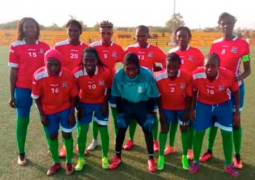On day six of the maiden edition of the NGO Week, participants attended a forum on climate, agriculture and environment at the TANGO conference Hall.
Presenting the topic: “What policy and institutional alternatives are available to the Gambia in meeting the food needs of its people in the face of climate change”, Peter Gibba from the Department of Water Resources said that climate change refers to a planet-wide increase in surface temperatures that are being caused by human activity.
He added that Climate Change is happening because of the greenhouse effect and further revealed that the climate is a dynamic entity which requires sustained monitoring and prediction order to avoid unpleasant shocks.
Gibba said: “Emissions from vehicles, powerplants and industrial livestock farming, as well as deforestation, among many other human activities, is resulting in too much greenhouse gas accumulating in the atmosphere.”
He indicated that the late onset and early cessation of the rains lead to shortening of the rainy season, increased inter-annual variability of production under rain-fed systems, raise stake in food security challenge, and rural-urban migration are some of the climate risks in agricultural production.
He however mentioned that The Gambia is a member of the World Meteorological Organization (WMO), whose mission is to save lives and property from natural hazards, managing disaster risks, protecting livelihoods and improving quality of life.
“As part of this partnership with WMO, The Gambia is currently operating 10 land surface weather observing/monitoring stations located in Banjul, Yundum (BIA), Sibanor, Kerewan, Jenoi, Kaur, Sapu, Jangjanbureh, Basse and Fatoto,” he said.
According to Gibba, the Gambia has ratified the United Nations Framework Convention on Climate Change (UNFCCC), noting that the ultimate objective of the Convention (UNFCCC) and any related legal instruments is to achieve stabilization of greenhouse gas concentrations in the atmosphere at a level that would prevent dangerous anthropogenic interference with the climate system.
He outlined that The Gambia started the implementation of its first National Adaptation Plans of Action (NAPA) project (Strengthening of The Gambia’s climate change early warning systems) in August 2011, which is expected to run until July 2014.
“The objective of the project is to enhance adaptive capacity and reduce vulnerability to climate change through a strengthened early warning and information-sharing mechanism for a better informed decision-making by government and affected populations,” he revealed.
“The National Climate Committee (NCC) is mandated to implement the United Nations Framework Convention on Climate Change in The Gambia,” he said, adding that the NCC’s roles and responsibilities are to create and enhance awareness on climate change and related social, economic and environmental issues, assessment and reporting on the options and measures to mitigate greenhouse gas emissions, among others.
Mr. Gibba said the most recently developed plan is the Programme for Accelerated Growth and Employment (PAGE), recognizing that the main drivers of the well-being for the country remain largely in agriculture and tourism sectors and that recent fluctuations in GDP are largely attributable to the effects of climate conditions.
He noted that climate change concerns, particularly in relation to adaptation and the adoption of a low carbon development strategy, were given due attention in the PAGE.
He revealed that investing in weather, climate and water information is an investment in well-being and prosperity for all.
“The climate is a dynamic entity which requires sustained monitoring and prediction order to avoid unpleasant shocks,” he said. “Therefore all stakeholders in climate sensitive sectors should take an interest in climate issues to improve their decision-making.”
Dilating on the topic “Building the national capacity at central and local levels to address climate change and ensure food security”, Badara Jobe from Njawara Agricultural Training Centre said that the provision of farm inputs and implements on a broad-based approach on field crops, orchards, woodlots and livestock (seed, farm tools, etc.), and raining on sustainable farm practices (agro-forestry, soil and water management, gender and marketing), water supply and irrigation techniques, are some of the food security activities.”
Some of the solution and opportunities of climate change are soil and water management (counter-planting, dyke and bond construction agro-forestry techniques), community and local institutions capacity-building on early warning signs and resilient, capacity building of local NGOs on carbon count and off set programmes, by adopting appropriate technologies (stoves, solar, wind and water energy) as well as involve in Disaster Risk Reduction and relief programmes.



